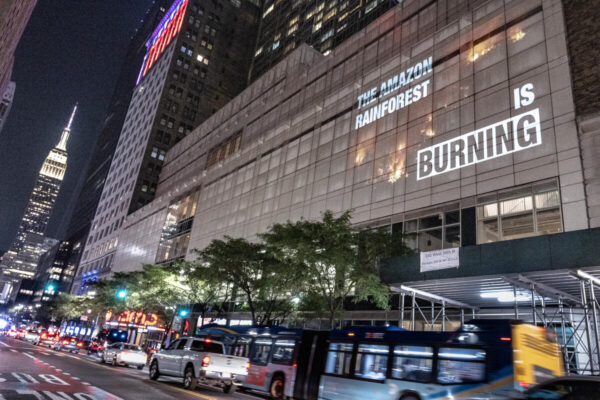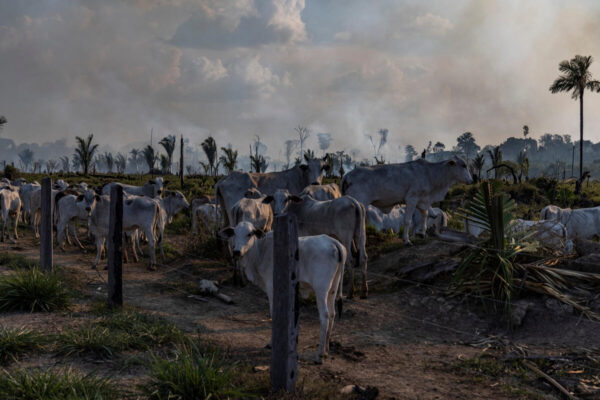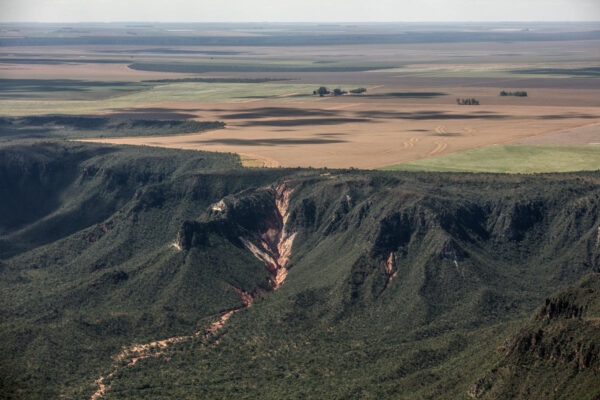Brazil threatened UK with trade action over deforestation legislation
Despite making budget cuts itself, Brazil's government also complained about underfunding of its environment agencies

Brazil’s government sought to weaken proposed UK legislation targeting deforestation in the supply chains of goods coming to the UK, documents have shown.
The proposed rules prevent large companies in the UK from using products grown on illegally deforested land. In submissions to a UK government consultation, Brazil’s government threatened to challenge the rules at the World Trade Organisation.
Brazil argues that the proposals target tropical deforestation, giving advantages to developed countries that have already been deforested, and may discriminate against tropical, developing countries.
The submission adds: “The Brazilian government reserves the right to raise objections, in the appropriate forums, to the bill that might be approved, due to its possible non-compatibility with WTO rules.”
The administration of far-right president Jair Bolsonaro, which has slashed environmental protection budgets and encouraged runaway deforestation of the Amazon, also argues that its forest-protection forces were too underfunded to effectively police illegal clearing.
The documents reveal that the Brazilian government objected to multiple elements of the proposals, claiming that they may discriminate against developing and tropical countries, and would have “deleterious effects on trade with the United Kingdom.”
Requiring businesses to have robust checking systems in place would be “highly burdensome”, the text adds.
The submissions to Defra’s consultations on UK due diligence legislation, from October 2020 and February 2022, were obtained by Unearthed via a Freedom of Information request to Brazil’s Foreign Ministry, after Defra refused to disclose them, arguing that doing so could harm international relations.

The first consultation, in 2020, related to deforestation rules in the UK Environment Act, which block businesses from using products grown on illegally deforested land. The second, in 2021, dealt with the details of those rules, and is expected to be contained in secondary legislation laid before parliament this autumn.
Agriculture is the leading cause of deforestation worldwide, and efforts are afoot in the UK, Europe and US to reduce the ‘deforestation footprint’ of imported goods such as soya, beef and palm oil.
On September 13, the European Parliament approved a bill requiring importing companies to verify whether products are produced in deforested areas – including those that were cleared legally. In the US, a similar law targeting illegal deforestation was introduced in the Senate in October 2021.
“We have an absurd setback posed by [Brazil’s] current federal government. It has no credibility to argue about this”
Deforestation in Brazil has soared over the last four years under the administration of President Jair Bolsonaro. Land-grabbers and ranchers have been emboldened by Bolsonaro’s vocal support for economic development over conservation. At the same time, severe budget cuts and personnel changes have hampered environment agencies’ capacity to curb illegal deforestation, leading to an atmosphere of permissive impunity.
Despite having made these cuts itself, in its 2020 submission Brazil argued the UK’s proposed rules fail to consider that the limited funds and manpower available to Brazil’s environment agencies make it difficult for them to enforce environmental laws.
“The proposal does not attach adequate importance to the challenges faced by developing economies in complying with their own environmental legislation, particularly their deficiencies in financial and institutional capabilities”, an official wrote.
Izabella Teixeira, former Brazilian Minister of the Environment and Co-Chair of the UN International Resource Panel, said that it was understandable that emerging countries like Brazil may want to oppose protectionism in the appropriate forums.
But she added that it was ironic for the Bolsonaro administration to use underfunding as a credible argument when it had brought about a “huge erosion of institutions”.
“This government … delivered, for four successive years, increasing deforestation and dismantling of environmental, scientific and cultural institutions. Brazil certainly needs international resources. We don’t have internal savings to deal with all the challenges,” Teixeira said. “But we have an absurd setback posed by the current federal government. It has no credibility to argue about this.”

Mercedes Bustamente, an ecologist from the Federal University of Brasilia, said that Brazil would be well-positioned to adhere to legislation like this, if the political will was there:
“There are powerful tools based on almost real-time remote sensing to identify at-risk areas. Besides, data show that illegal deforestation is concentrated in a few municipalities and involves only [some] of the farmers,” she said. “Calls for accountable supply chains have been there for a while, climate change is accelerating, and Brazil has more conditions than any other tropical country to implement a plan that reconciles conservation and agricultural production.”
Regardless of its current capacity to enforce them, Brazil has rigorous rules around deforestation. Its “Forest Code” law rules that 80% of an Amazonian rural property must be left untouched, and the Amazon Soya Moratorium bans the sale of soya from recently deforested land.
Brazil argues that the law’s proposed focus on illegal deforestation would give countries with laxer environmental laws a competitive advantage.
“The proposal tends to discourage countries, particularly developing countries, from adopting environmental legislation with higher standards of protection,” the 2020 submission reads.
A study published in Science earlier this month found that 90-99% of all deforestation in the tropics is related to agriculture. These new laws seek to address the crucial part played by demand for agricultural commodities from Western countries.
GAPS IN THE RULES
Campaigners say that the legislation does not go far enough, due to the scale of legal deforestation that is allowed in parts of Brazil.
Research by WWF has shown that across the municipalities in Brazil that supply soya directly to the UK, as much as 21,000 sq kms – an area the size of Israel – could be legally cleared.
Bolsonaro has also repeatedly sought to expand the definition of legal deforestation, whether by changes to land-grabbing laws which extend amnesty and land-titles to illegal clearances, by opening up Indigenous lands to farming, or by stripping status from protected areas.
Brazil asked in its submissions how the UK government would identify businesses sourcing from illegally deforested land, and what fines or sanctions they would face.
“What sources of information would be used and which could be more reliable than those reported by the companies themselves?” officials wrote, adding: “Would the government consider applying fines and sanctions on the basis of unproven and legally questionable third-hand information?”
Relying on companies’ own reporting brings its own complications. JBS and Marfrig, the world’s biggest meatpackers, have said they will be free of illegal Amazon deforestation by 2025, and have launched systems for supply chain monitoring. But a recent Reporter Brasil analysis, published on Unearthed, revealed aspects of these claims may be flawed. Reporting and audits have repeatedly linked JBS to illegal deforestation.
In its 2022 submission, Brazil makes its own suggestion: the Brazilian government itself could report illegal deforestation in companies’ supply chains.
It suggests: “Recognition of the sovereign capacity of governments to certify compliance with their own laws on deforestation and land use, thus declaring products coming from their territory as “non-forest risk commodities”.
Marcio Astrini, executive secretary of the Brazilian Climate Observatory, a network of 50 civil society organisations, said that: “The response of the current Brazilian government is backwards and goes against the climate agenda and what is being discussed today in the world…Brazil has all the conditions to export deforestation-free products and can be an example on this agenda, but this will only be possible with a new government.”
In the documents obtained by Unearthed, Brazil’s Ambassador to the United Kingdom, Fred Arruda, also asks Brasilia for Brazil’s Foreign Ministry to bring together other tropical countries which export agricultural commodities to jointly express their concern around the legislation, including Cameroon, Paraguay, Indonesia, and Malaysia.
Earlier this year Brazil led a similar offensive against EU legislation. In a document obtained by Greenpeace, EU ambassadors from Brazil and Indonesia, as well as Argentina, Ghana, Nigeria, Peru, Bolívia, Malaysia and others warn that the rules around deforestation in supply chains could cause “trade distortions and diplomatic tensions, without benefit to the environment”.
Neither Brazil’s Foreign Ministry nor Ambassador Arruda responded to a request for comment.
A UK government spokesperson said: “We have introduced world-leading due diligence legislation through the Environment Act to help tackle illegal deforestation in the United Kingdom’s supply chains – and we are committed to implementing this legislation at the earliest opportunity.
“We aim to work in partnership with producer countries, supporting their efforts to uphold their laws and strengthen environmental protection, and we will continue to do so without compromising our principles.”

